Coronavirus: 'I'm scared my dreams of becoming a mother are gone'
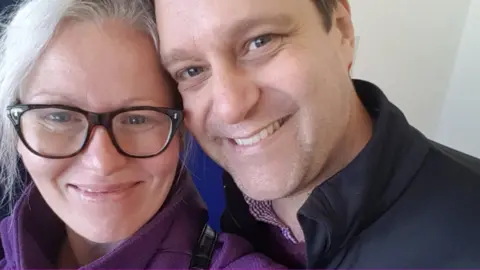 Sian Brindlow
Sian BrindlowWomen hoping to become mothers are worried it might never happen, as fertility clinics around the world stop treatment in response to the coronavirus pandemic.
"I want a baby with my husband. We've been dreaming of this baby for 12 years," says Sian Brindlow, from West Sussex.
"I am scared all those dreams are gone."
She's one of many people who were about to undergo fertility procedures, only to be told that coronavirus restrictions meant their treatments were being put on hold indefinitely.
Sian is 40, and she and her husband had just started their third cycle of IVF, when news of the suspension reached them.
Their two previous cycles of IVF were unsuccessful.
The procedures she has already been through have affected her and her husband's mental health and the impact of coronavirus is also taking its toll.
"We have no idea what's going to happen," she says. "It's really tough."
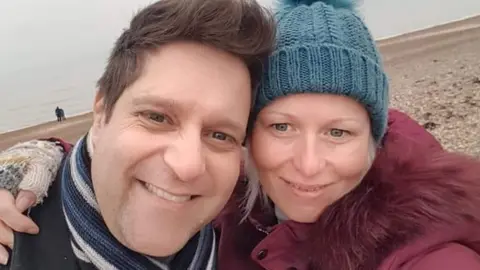 Sian Brindlow
Sian BrindlowFertility clinics in many countries have stopped their services and there's currently no clear indication on when they will reopen.
"We understand this is a difficult time for patients and clinics with all fertility treatment being stopped from 15 April 2020," the Human Fertilisation & Embryology Authority (HEFA), in the UK, said in a statement.
"We will do all we can to lift this restriction as soon as possible but we cannot give a date when this will happen given the current situation with the Covid-19 pandemic."
In the US, the American Society for Reproductive Medicine (ASRM), has reiterated recommendations suspending new treatment cycles.
The Federation of Obstetric and Gynaecological Society of India (FOGSI) says that "new treatments for fertility care and other similar conditions should be deferred".
The ban in the UK came into force on 15 April, but appointments started being cancelled back in March, when clinics were advised to not start new treatments.
Delay and success
Sian says she understands why her IVF had to be postponed but the last couple of weeks have still left her heartbroken.
Before coronavirus spread to the UK, she had hoped freezing some embryos would give her security while she is on a waiting list for surgery. Now, she doesn't have that reassurance.
"I genuinely thought that if I could just get to the point where they could do the egg collection, and have the eggs frozen, that would be fine. Then we wouldn't have to worry as much about [my] age," she says.
At this point, she is still hopeful that her treatment will go ahead in the not too distant future.
"I am prepared to wait it out, if it means it's going to happen" says Sian. But she's aware her dreams might not come true.
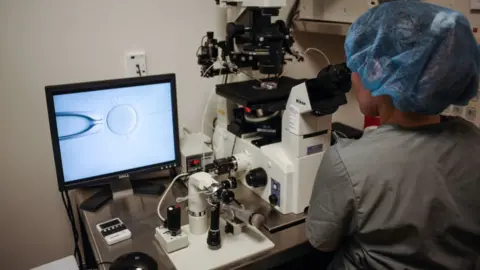 Getty Images
Getty ImagesExperts say stopping fertility treatments will contribute to slowing the spread of coronavirus and means medical staff can be redeployed to help patients with Covid-19.
Many people waiting for other kinds of surgery and procedures have also faced delays.
Dr Marco Gaudoin, a fertility specialist, says that there will be "an impact" on some women waiting for treatment, as success is dependent on age and time.
"Statistically from the age of 34 onwards, for every month that passes your chances drop by around 0.3%. So after six months it's about 2%," he told BBC Scotland.
"If you are only starting at a level of 14% chance of it working, six months later you are down to 12%.
"That is a big drop proportionately and there will be an impact on patients chances of success."
Fertility charities say they've seen an increase in people getting in touch with them for guidance.
Gwenda Burns, chief executive of the Fertility Network which offers specialist support in the UK, says: "It's quite distressing and devastating to almost get to have your treatment after a very emotional journey to then be told everything is cancelled."
'I dreamed of having a bump'
Although Katy Brunton is 32, she has concerns about the effect this delay will have on her ability to have a biological child.
She and her husband have been trying for a baby for almost three years.
Katy, who is from Dorset, has been diagnosed as having a decreased egg reserve for her age and this is a factor in the couple needing medical assistance to start their family.
They've been through multiple rounds of IVF with no success.
"People are very quick to talk about your age in fertility," she says.
"I'm still young in terms of the fertility world, but I don't have many eggs left and the thought of that time just ticking away is really scary."
Katy was intending to start a new cycle of treatment, using frozen embryos, and had been for an appointment just days before the restrictions were first introduced.
"I really hope that we get to do our treatment and my dream will always be to grow our family," she says.
"I've always dreamed of one day having a bump."
Katy articulated something many people struggling with infertility mentioned, about how hard it's been to hear about young families being in lockdown together.
"There's a lot of people talking about how awful it is being stuck in their homes with children at the moment," she says.
"I would do anything to be stuck inside with a screaming toddler right now, I really would."
'You can't have it'
Midwife Eleanor Crabb is 35 and from Dorset, and has been trying for a baby with her husband for more than four years.
After some failed attempts, they had used donor eggs and were hoping to have an embryo transfer this month, but this has been cancelled and the embryo remains frozen.
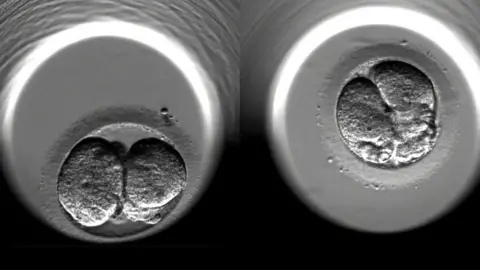 Getty Images
Getty ImagesEleanor loves being a midwife but says caring for pregnant women makes dealing with infertility even more difficult.
"Imagine you work in a cake factory, and all you want to do is eat the cake but you're not allowed any of it. Ever".
She works hard not to let her feelings impact on anyone's care. Coronavirus has made it a even more of struggle.
"I can't have my embryo transfer, I don't know when that's going to be," she says.
"Will it even work? Will I ever have a baby? Will I ever be a mum?
"And then I have to go into work, looking after pregnant women, who need me to be caring and understanding, whilst also wearing a face mask, a visor, apron and gloves.
"They can only see your eyes, so it's really difficult to look after people in the same way."
'Sense of failure'
London-based writer Seetal Savla, 38, blogs about her fertility journey, hoping that reading about her story will help people in a similar situation.
"It's hard to discuss that sense of failure," she says. "You're repeatedly trying to get pregnant and nothing ever happens.
"It does make me feel like a failure as a woman, as a wife, and then in the extended roles, as a daughter-in-law, a daughter and a granddaughter."
She and her husband were on their fourth cycle of IVF when the clinics shut down, and they have now frozen one embryo.
Like many others, Seetal felt devastated, but she says having coped with previous losses, she has become more resilient.
"But that doesn't mean it isn't tough, and there are moments you feel hopeless," she says.
When she first started getting help with her fertility, Seetal says she was comforted by reading stories from the TTC (Trying to Conceive) community on Instagram.
Now she's trying to give back to others, by sharing her experiences online.
"People who are going through it, they can relate to the story, especially Indians, because there aren't that many Indian voices talking about the cultural pressures and expectations that we face."
'A biological mum'
Most of the people BBC 100 Women heard from had been going through years of tests and procedures. They described how fertility treatment had come to dominate everything, and they had been living from one appointment to the next.
The cancellations have left them reeling.
"What happens over the next 12 months might dictate the rest of my whole life," says Siobhan, who doesn't want to use her full name.
"The outcome could be the difference between me being a biological mum or not."
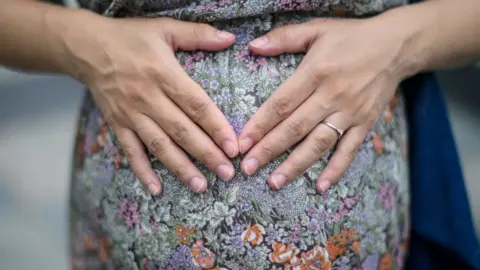 Getty Images
Getty ImagesShe's 41 and experienced miscarriages in the past. She's also had to overcome various health conditions in order to have IVF and it was only recently that her doctors had found the right regimen to help her.
"I was in a good position two months ago. Will I be in a good position in a year? I don't know," she says.
She's also concerned about how the backlog will be dealt with, once treatment does resume.
"Who goes first? My husband and I were scheduled for April. Will it be the same order?
"That doesn't seem fair to me because there are probably women who are in a worse position than me, biologically, who probably need to go first to give themselves the optimum chance."


What is 100 Women?
BBC 100 Women names 100 influential and inspirational women around the world every year. We create documentaries, features and interviews about their lives - stories that put women at the centre.
